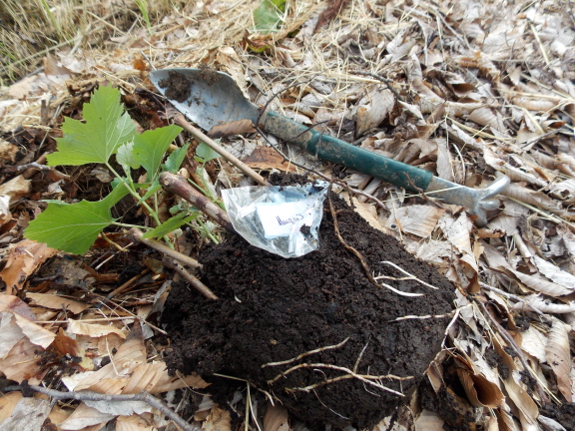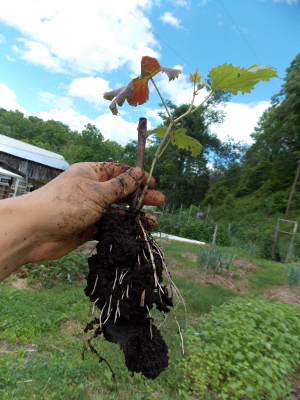
Seedless, disease-resistant grapes

One of the first
things I learned to root was grapes, and thus we
set out quite a number of vines near the beginning of our time on
the farm. But we didn't have the cash to buy fancy varieties
then, so we got the cuttings from a friend who was raising grapes
conventionally (with lots of chemicals) to make wine. Since
I wasn't willing to dose our new vines, they came down with every
malady under the sun, and last year we completely ripped them
out.
 Now we're selecting for disease resistance,
and also for seedlessness since Mark doesn't like grapes with
seeds. (To be honest, I prefer seedless grapes too, even
though I'm a pro at popping a tough-skin, seeded grape in my
mouth, masticating, then spitting out the seeds.) So far,
our young Mars Seedless grapes seem to be doing well in the first
department, but we won't know about fruiting for a year or two
more.
Now we're selecting for disease resistance,
and also for seedlessness since Mark doesn't like grapes with
seeds. (To be honest, I prefer seedless grapes too, even
though I'm a pro at popping a tough-skin, seeded grape in my
mouth, masticating, then spitting out the seeds.) So far,
our young Mars Seedless grapes seem to be doing well in the first
department, but we won't know about fruiting for a year or two
more.
This spring, Brian
sent me a bunch of cuttings from his plants, and the grapes are
rooting wonderfully. So we'll be adding Marquis, Reliance,
and Thomcord to our experimental planting this year too.
Check back in two to
four years for results on my disease-resistant, seedless grape
experiment. In the meantime, perhaps our readers would like
to chime in about which seedless grapes have done well in their
gardens without sprays?
Want more in-depth information? Browse through our books.
Or explore more posts by date or by subject.
About us: Anna Hess and Mark Hamilton spent over a decade living self-sufficiently in the mountains of Virginia before moving north to start over from scratch in the foothills of Ohio. They've experimented with permaculture, no-till gardening, trailersteading, home-based microbusinesses and much more, writing about their adventures in both blogs and books.
Want to be notified when new comments are posted on this page? Click on the RSS button after you add a comment to subscribe to the comment feed, or simply check the box beside "email replies to me" while writing your comment.

SEE: Seedless Grapes Cultivars: http://www.hort.cornell.edu/reisch/grapegenetics/bulletin/table/tabletext3.html
Relative susceptibility of table grape varieties to low-temperature injury, disease, and leaf damage resulting from sulfur applications: http://www.hort.cornell.edu/reisch/grapegenetics/bulletin/table/TTable2.html
Successive Ripening: http://www.hort.cornell.edu/reisch/grapegenetics/bulletin/table/TTable1.html
I've had luck with Canadice, Himrod, Interlaken, Mars, Vanessa, and Reliance.
Being in the dry heat of California, I can't speak to disease resistance. However, we are growing ThomCords here and they are really delicious! Hope they do well over there because they are a really special grape. We don't spray any chemicals, and the vines are healthy and vigorous. We're also growing Blueberry grapes, which look like the ThomCords, but really do taste blueberry-ish.
Black rot is the one disease that has affected Virginia vintners the most. I am told that, prior to the various antifungal sprays, the loss due to black rot within Virginia was total.
As for my own experience, we have taken some losses due to black rot, but not total losses. It may be that the individual grapes within the bunches are bad, but there are plenty of decent grapes within the bunch. They may have been infected with black rot, and perhaps they would wither in a couple more days, but there seemed to be grapes on each cluster that were at least good eating right off the vine. There are also drier years than others, so crop failure is not likely to be total each year. Finally, before giving up all hope, one farmers daughter shared with me that her family never sprayed, and never had problems with black rot. Therefore, something is possible in the way of raising grapes without sprays.
I, for one, would like to find out what.
Dan
Your page says to check back in 3-4 years, and it's been four years since it was last updated.
I just pulled out three grape vines of my own that were all infected with black rot. I used to have just one, but I tried to keep it and followed various advice. Now it's two years later and I am giving up before it spreads to more vines.
I have had good luck with Neptune so far. It showed signs of black rot two years back, but last year there were no signs of it and this year it is looking great as well.
Canadice was the first to get the black rot and could never seem to recover. Einset got infected very strongly and I had to pull out the vine. Never even got a single grape from it.